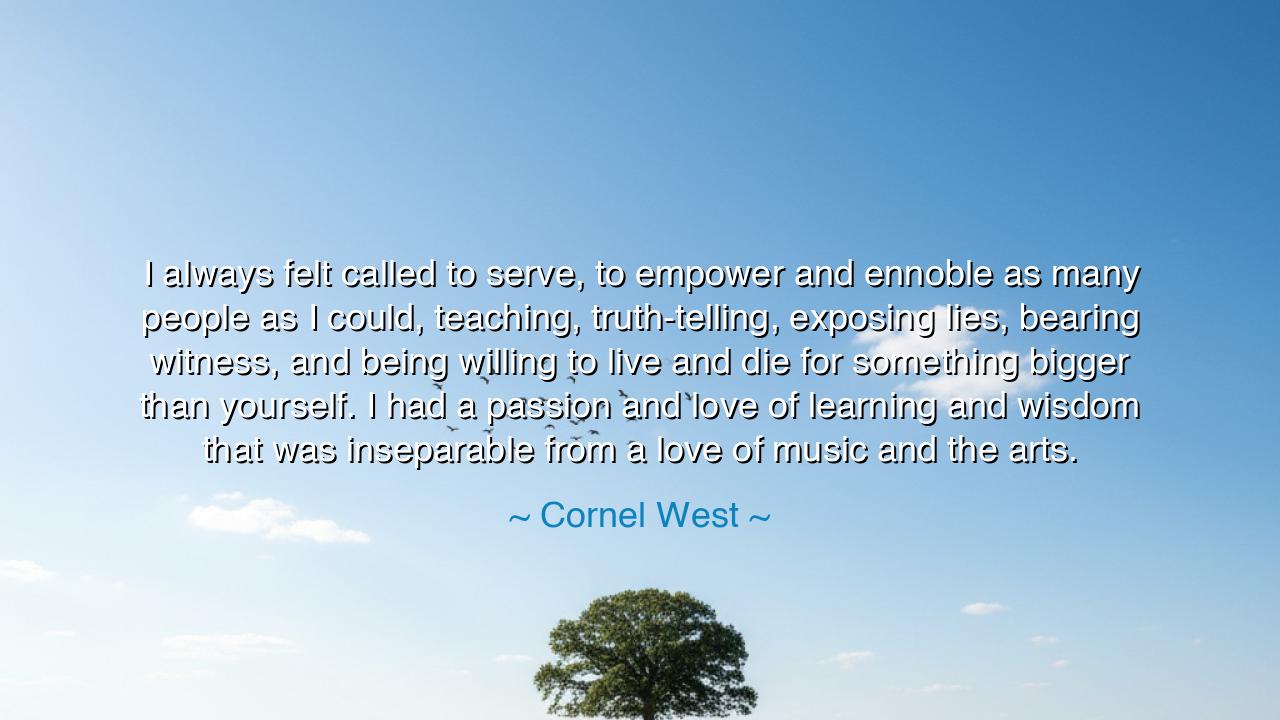
I always felt called to serve, to empower and ennoble as many
I always felt called to serve, to empower and ennoble as many people as I could, teaching, truth-telling, exposing lies, bearing witness, and being willing to live and die for something bigger than yourself. I had a passion and love of learning and wisdom that was inseparable from a love of music and the arts.






Cornel West, prophet of justice and lover of the human spirit, proclaims: “I always felt called to serve, to empower and ennoble as many people as I could, teaching, truth-telling, exposing lies, bearing witness, and being willing to live and die for something bigger than yourself. I had a passion and love of learning and wisdom that was inseparable from a love of music and the arts.” In this confession burns the ancient fire of vocation, the sense that life is not one’s own possession, but a trust to be poured out for the uplift of others. He binds service, truth-telling, and wisdom with the sacred threads of art, showing that the pursuit of beauty and knowledge is inseparable from the struggle for justice.
The ancients, too, spoke of such calling. Plato described the philosopher as one who leaves the cave of illusion to behold the truth, but who then returns, out of duty, to guide his fellow prisoners toward the light. West stands in this same tradition, refusing to hoard knowledge for himself, but using his voice to empower and ennoble, to unmask falsehood, and to bear witness even at great cost. This is the hero’s path, where one’s own life is willingly placed beneath the weight of a higher cause.
History bears shining testimony in the life of Socrates, who chose death rather than silence. He, too, lived and died for something greater than himself: the pursuit of truth, and the moral awakening of Athens. By exposing lies and calling men to examine themselves, he became a martyr for wisdom. Cornel West’s words echo this ancient defiance: to bear witness against corruption, to refuse compromise with falsehood, and to stand even when the price is one’s own life.
But West also reminds us that learning and wisdom cannot be severed from music and the arts. The ancients called the nine Muses the daughters of memory, for art was never a luxury, but a channel through which truth and beauty entered the world. In the Psalms of David, wisdom sang; in the tragedies of Sophocles, justice was revealed; in the jazz of West’s own heritage, freedom found its rhythm. Thus he teaches that art and knowledge are not rivals, but companions, each deepening the power of the other.
Let the generations remember: a life worth living is a life given for others, a life of service, truth-telling, and witness, where wisdom and art are joined in harmony. To live for something greater than oneself is to enter the company of prophets and poets, of martyrs and musicians, of all who lifted their voices for love, justice, and truth. This is the destiny West embraces, and the path he holds out to all: to serve, to empower, to love, and to stand unflinching before the eternal call of the soul.






THThi Ho
Reading this, I am curious about the relationship between public action and personal enrichment. Can teaching, truth-telling, and exposing injustice coexist with a deep appreciation for music and arts without burnout? I also question how these practices influence one another—does engagement with the arts enhance empathy and insight, making ethical work more effective? The quote challenges me to reflect on the integration of passion, wisdom, and service in a purposeful life.
LNLinh Nguyen
This quote prompts reflection on vocation and calling. I wonder how individuals discover the intersection of their talents, passions, and social purpose. Does West suggest that the pursuit of wisdom is inseparable from a love of beauty and culture, or is it a personal synthesis unique to him? It encourages me to consider how each person can find ways to channel learning, ethical engagement, and creativity into meaningful action in their own lives.
0T09 Truonganh_
I feel inspired but also challenged reading this quote. It raises questions about the nature of courage and commitment: what does it truly mean to be willing to live and die for something greater than oneself? I also wonder how art and music play a role in ethical and intellectual development. Could creative expression be as essential to understanding truth and fostering wisdom as study and activism?
HNTran Thi Huynh Nhi
This statement sparks curiosity about the connection between service and personal fulfillment. I question whether West’s commitment to empowering others might come with personal sacrifices, and how one sustains passion for justice and learning over time. How do dedication to social causes and appreciation for music and arts influence one another? It makes me think about how meaning in life can emerge when intellectual, moral, and aesthetic pursuits are intertwined.
YHYen Hai
Reading this, I’m struck by the integration of intellect, ethics, and artistic passion in Cornel West’s life. I wonder how he balances the demands of truth-telling and public service with personal growth and creative expression. Is it possible for others to emulate such a holistic approach, or does it require a rare combination of temperament and opportunity? The quote inspires reflection on the ways love for knowledge and the arts can fuel moral and social engagement.